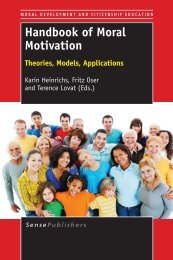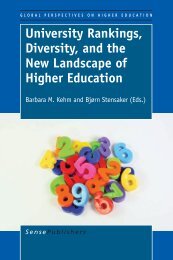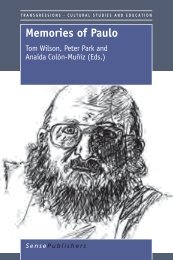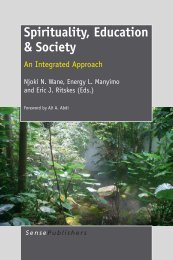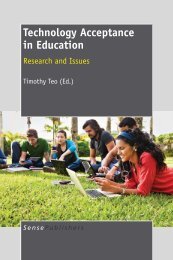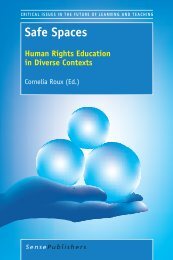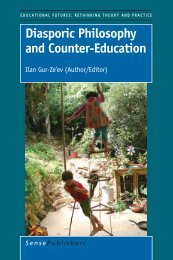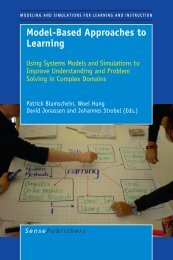Rupturing Concepts of Disability and Inclusion
Rupturing Concepts of Disability and Inclusion
Rupturing Concepts of Disability and Inclusion
Create successful ePaper yourself
Turn your PDF publications into a flip-book with our unique Google optimized e-Paper software.
PROLOGUE<br />
burdens, or, in fact, as potential death. My gaze on such otherness became centred,<br />
not around the notion <strong>of</strong> the distressed <strong>and</strong> suffering stranger, but <strong>of</strong> the potential<br />
sibling; <strong>and</strong> therefore, <strong>of</strong> imagined relationships.<br />
I recall my mother’s willingness to ‘mind’ people with disability for parents to<br />
go out. I remember the respect shown to the Spastic Centre building located a few<br />
streets away, <strong>and</strong> the way the work inside was held in the highest regard. This was<br />
work never visited but always reified. And I recollect the disallowing <strong>of</strong> certain<br />
language; for example, to call someone a ‘spastic’, a ‘retard’, an ‘idiot’, or a<br />
‘simpleton’ received similar rebukes to that reserved for blasphemy. I have since<br />
<strong>of</strong>ten wondered why these actions, though subtle, were so dominant. Obviously,<br />
the stillbirth had had a large impact. But this had not been the totality <strong>of</strong> my<br />
parents’ experiences. I am sure, though, that the influence <strong>of</strong> different experiences<br />
initiated particular moral responses.<br />
My father, a war veteran, was a labourer, employed as a council worker, then a<br />
gardener. My mother, though employed for a short time, mainly shared her skills in<br />
a volunteer context. So their different experiences were ones lived by the<br />
embracing <strong>of</strong> hardship always in tension with determination to seek betterment,<br />
‘rightness’ <strong>and</strong> success, <strong>of</strong>ten at personal cost. This has been their gift to their<br />
children; <strong>and</strong> to any community in which they have lived. But these actions,<br />
performed on the margins, are invisible to popular media portrayal or public award.<br />
These actions are primarily acknowledged in the private lives <strong>of</strong> those in accepting<br />
relationships. Therefore, I have gained an embodied inheritance – my body has<br />
been inscribed with compassion, sensitivity, respect <strong>and</strong> empathy; captioning a text<br />
about difference formed in my imagination from the seeds <strong>of</strong> my parents’<br />
experience. So it was somewhat inevitable that some <strong>of</strong> these texts were to become<br />
expressed in another medium, namely a vocational choice.<br />
After completing secondary school in the mid-1970s, I chose to undertake<br />
training to become a registered general nurse at a large metropolitan hospital some<br />
700 km from home. This was, in my eyes, an inferior choice. I had always yearned<br />
to study medicine, but this proved to be an unachievable goal. Undertaking nurse<br />
training, though seemingly gender-appropriate <strong>and</strong> romantically endorsed as a<br />
‘helping’ pr<strong>of</strong>ession, proved to be an achievable nightmare! During the three <strong>and</strong> a<br />
half years <strong>of</strong> being at that hospital (3 years <strong>of</strong> training plus 1/2 year employed as<br />
a registered nurse), I could never feel comfortable with the militaristic style <strong>of</strong> the<br />
pr<strong>of</strong>ession. Compliance to ‘authority’ through the surrendering <strong>of</strong> any sense <strong>of</strong> self<br />
was not only comm<strong>and</strong>ed, but any form <strong>of</strong> non-compliance brought reprim<strong>and</strong> <strong>and</strong><br />
humiliation. Status was hierarchically determined from senior medical staff down,<br />
<strong>and</strong> this was played out in every arena. This included the staff dining room where<br />
one could only sit within the bounds <strong>of</strong> pre-determined areas, according to status.<br />
The ethos <strong>of</strong> the hospital was configured on the premises <strong>of</strong> power, expert knowledge<br />
<strong>and</strong> authority, all <strong>of</strong> which covertly depended on a dialectical relationship with<br />
vulnerability, naivety <strong>and</strong> submission. The latter descriptors represented, then, the<br />
experience <strong>of</strong> subservient groups such as nurses <strong>and</strong> patients; groups which overtly<br />
depended on the dominating forces.<br />
xviii




